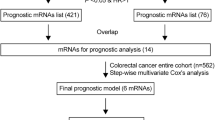Abstract
In recent years, the use of gene expression analysis to predict the occurrence and development of cancer has become a hot research field. However, existing gene expression prediction models face some limitations, such as complex sample processing and high cost, which limit their clinical application. There is currently a lack of ideal markers for colorectal cancer. Although some tumor markers have been used for clinical prediction, diagnosis and treatment of colorectal cancer, their sensitivity is low and often can not meet the needs of early clinical tumor prediction. This study aims to explore a new, low-cost cancer prediction method that uses optical imaging technology combined with gene expression analysis to predict the association between tumor marker LINC01207 and cancer, providing a new strategy for the early diagnosis of cancer. The study used an advanced optical imaging system combined with gene expression data analysis methods to study the expression patterns of LINC01207 in cancer. The findings show that LINC01207 has been shown to promote the aggressiveness and migration of CRC cells, suggesting that it may play a key role in the metastasis of the disease, making it a potential marker for predicting the progression and prognosis of the disease. The identification of LINC01207 as a potential biomarker for CRC has important implications for the diagnosis and treatment of the disease. By utilizing LINC01207 as a predictive marker, it may be possible to identify patients at high risk for colorectal cancer and initiate early intervention to prevent or delay disease progression.








Similar content being viewed by others
Data availability
The data will be available upon request.
References
Araghi, M., Soerjomataram, I., Bardot, A., Ferlay, J., Cabasag, C.J., Morrison, D.S., Arnold, M.: Changes in Colorectal cancer incidence in seven high-income countries: A population-based study. Lancet Gastroenterol. Hepatol. 4(7), 511–518 (2019)
Biller, L.H., Schrag, D.: Diagnosis and treatment of metastatic Colorectal cancer: A review. Jama. 325(7), 669–685 (2021)
Dongre, A., Weinberg, R.A.: New insights into the mechanisms of epithelial–mesenchymal transition and implications for cancer. Nat. Rev. Mol. Cell Biol. 20(2), 69–84 (2019)
Grady, W.M., Markowitz, S.D.: The molecular pathogenesis of Colorectal cancer and its potential application to Colorectal cancer screening. Dig. Dis. Sci. 60, 762–772 (2015)
He, H., Yang, G., Wang, S., Han, X., Li, J.: Fast-track Surgery nursing intervention in CRC patients with laparotomy and laparoscopic Surgery. Medicine, 101(37), e30603. (2022)
Kuipers, E.J., Grady, W.M., Lieberman, D., Seufferlein, T., Sung, J.J., Boelens, P.G., Watanabe, T.: Colorectal cancer. Nature reviews. Disease Primers. 1, 15065–15065 (2015)
Li, C., Lu, H.: Adenosquamous carcinoma of the lung. OncoTargets and Therapy, 4829–4835. (2018)
Park, J.H., Shin, J.E., Park, H.W.: The role of hippo pathway in cancer stem cell biology. Mol. Cells. 41(2), 83 (2018)
Passardi, A., Canale, M., Valgiusti, M., Ulivi, P.: Immune checkpoints as a target for Colorectal cancer treatment. Int. J. Mol. Sci. 18(6), 1324 (2017)
Rasool, S., Kadla, S.A., Rasool, V., Ganai, B.A.: A comparative overview of general risk factors associated with the incidence of Colorectal cancer. Tumor Biology. 34, 2469–2476 (2013)
Schmitt, M., Greten, F.R.: The inflammatory pathogenesis of Colorectal cancer. Nat. Rev. Immunol. 21(10), 653–667 (2021)
Schöffski, P., Sufliarsky, J., Gelderblom, H., Blay, J.Y., Strauss, S.J., Stacchiotti, S., Wozniak, A.: Crizotinib in patients with advanced, inoperable inflammatory myofibroblastic tumours with and without anaplastic Lymphoma kinase gene alterations (European Organisation for Research and Treatment of Cancer 90101 CREATE): A multicentre, single-drug, prospective, non-randomised phase 2 trial. The Lancet Respiratory Medicine. 6(6), 431–441 (2018)
Seyfried, T.N., Huysentruyt, L.C.: On the origin of cancer Metastasis. Crit. Reviews™ Oncog. 18, 1–2 (2013)
Takahashi, M., Cuatrecasas, M., Balaguer, F., Hur, K., Toiyama, Y., Castells, A., Goel, A.: The clinical significance of MiR-148a as a predictive biomarker in patients with advanced Colorectal cancer. (2012)
Vilalta, M., Rafat, M., Graves, E.E.: Effects of radiation on Metastasis and Tumor cell migration. Cell. Mol. Life Sci. 73, 2999–3007 (2016)
Vuik, F.E., Nieuwenburg, S.A., Bardou, M., Lansdorp-Vogelaar, I., Dinis-Ribeiro, M., Bento, M.J., Spaander, M.C.: Increasing incidence of Colorectal cancer in young adults in Europe over the last 25 years. Gut. 68(10), 1820–1826 (2019)
Funding
This study was supported by Reserve outstanding talents of Shanghai University of traditional Chinese Medicine (RCPY0037).
Author information
Authors and Affiliations
Contributions
GH has done the first version, WC, WP and YC has done the simulations. All authors have contributed to the paper’s analysis, discussion, writing, and revision.
Corresponding author
Ethics declarations
Ethical approval
Not applicable.
Competing interests
The authors declare no competing interests.
Additional information
Publisher’s Note
Springer Nature remains neutral with regard to jurisdictional claims in published maps and institutional affiliations.
Rights and permissions
Springer Nature or its licensor (e.g. a society or other partner) holds exclusive rights to this article under a publishing agreement with the author(s) or other rightsholder(s); author self-archiving of the accepted manuscript version of this article is solely governed by the terms of such publishing agreement and applicable law.
About this article
Cite this article
Hu, G., Chen, W., Peng, W. et al. Application of optical imaging technology for prediction of rectal cancer using tumor marker LINC01207 based on gene expression. Opt Quant Electron 56, 438 (2024). https://doi.org/10.1007/s11082-023-06140-6
Received:
Accepted:
Published:
DOI: https://doi.org/10.1007/s11082-023-06140-6




